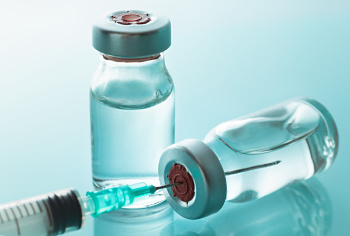Breast Cancer Treatment Could Preserve Ovarian Function

Ovarian function could be preserved for some women with breast cancer, reducing their chances of undergoing early menopause and potentially increasing their chances of becoming pregnant, according to the results of the Prevention of Early Menopause Study (POEMS).
Researchers have found that adding injections of a drug called goserelin to standard chemotherapy lowered the risk of ovarian failure in women with hormone-receptor negative breast cancer.
Breast cancer is classified by its hormone receptor status. Found in cancer cells, receptors are proteins that attach to the hormones estrogen and progesterone. Unfortunately, these hormones spur the growth of more cancer cells. Women with hormone-receptor positive breast cancer might take hormone therapy drugs to control the cancer.
Not all breast cancers have hormone receptors, however. Women with hormone-receptor negative breast cancer would not take hormone therapy drugs. This type of cancer is more common in women who have not gone through menopause yet.
Chemotherapy, a common breast cancer treatment, can damage the ovaries, leading to early menopause. At this point, women can no longer become pregnant and may develop sexual problems, such as vaginal dryness.
In the POEMS, researchers wanted to see whether early menopause could be avoided in women with hormone-receptor negative breast cancer.
Two hundred eighteen women were divided into two treatment groups. One group (113 women) had standard chemotherapy. The other group (105 women) received goserelin injection in addition to chemotherapy.
After analyzing five years of follow-up data, the researchers determined that 23% of the women in the goserelin + chemotherapy group had become pregnant. Only 12% of the women who received chemotherapy alone had done so.
In addition, the women in the goserelin + chemotherapy group had better five-year survival rates. At that point, 88% of those women were alive and disease-free. In the standard chemotherapy group, the rate was 79%.
“Goserelin protects the ovaries from the effects of chemotherapy, reducing the risk for early menopause,” said lead researcher Dr. Halle Moore in a press release. “By getting these injections, more women became pregnant without negatively affecting their health or their chances of surviving their cancer.”
“Our final results show a means to improve quality of life for young women with hormone-receptor negative breast cancer. If they want to be mothers, they can improve their chances safely and effectively,” she added.
The findings were published in October in the Journal of the National Cancer Institute.
Resources
American Cancer Society
“Breast Cancer Hormone Receptor Status”
(Last revised: September 25, 2017)
https://www.cancer.org/cancer/breast-cancer/understanding-a-breast-cancer-diagnosis/breast-cancer-hormone-receptor-status.html
Journal of the National Cancer Institute
Moore, Halle C.F., MD, et al.
“Final Analysis of the Prevention of Early Menopause Study (POEMS)/SWOG Intergroup S0230”
(Abstract. October 27, 2018)
https://academic.oup.com/jnci/advance-article-abstract/doi/10.1093/jnci/djy185/5145902?redirectedFrom=fulltext
SWOG Cancer Research Network
“Hormone Injections Reduce Early Menopause”
(October 27, 2018)
https://www.swog.org/news-events/news/2018/10/29/hormone-injections-reduce-early-menopause
You may also be interested in...
Other Popular Articles

What Is the Average Penis Size?
If you have ever wondered how your penis compares to others in terms of size, you are not alone. Many men are curious to know how their penises stack up compared to the average. Unfortunately, general curiosity can sometimes give way to full-on obsession and anxiety about penis size. This can be an unhealthy and often unnecessary fixation, especially because most men who think their penises are too small have perfectly normal-sized penises.

What Is Jelqing, and Does It Actually Work?
The term “jelqing” refers to a set of penis stretching exercises that some believe can make the penis bigger. Although the practice has gained attention and popularity in blogs and internet forums in recent years, there is no scientific evidence that it is an effective way to permanently increase the size of one’s penis. In fact, in some cases, jelqing may actually cause damage to the penis, so it is a good idea to get all the facts before setting off to try it.

What Is Sensate Focus and How Does It Work?
Sensate focus is a technique used to improve intimacy and communication between partners around sex, reduce sexual performance anxiety, and shift away from ingrained, goal-oriented sexual patterns that may not be serving a couple.

Can Sex Reduce Menstrual Cramps?
The SMSNA periodically receives and publishes ‘guest editorials.’ The current article was submitted by Mia Barnes, a freelance writer and researcher who specializes in women's health, wellness, and healthy living. She is the Founder and Editor-in-Chief of Body+Mind Magazine.
Having sex while you experience menstrual cramps is healthy and can provide significant benefits. While it might not be the first activity that comes to mind when your PMS or period cramping begins, many people enjoy sex to reduce menstrual cramps, experience increased pleasure and benefit from other advantages. Learn more about having sex while menstrual cramps are happening and how it can help your body.

How Long Does It Take the Average Man to Ejaculate?
On average, it takes a man between 5 to 7 minutes to orgasm and ejaculate during sexual intercourse.

Can Sex Throw off Your Vaginal pH Balance?
The SMSNA periodically receives and publishes ‘guest editorials.’ The current article was submitted by Mia Barnes, a freelance writer and researcher who specializes in women's health, wellness, and healthy living. She is the Founder and Editor-in-Chief of Body+Mind Magazine.
Your vagina is a pretty powerful organ. It is a pathway for menstrual blood and babies. It also is a main player in sexual intercourse. You might hear about your vagina’s pH and worry that yours is at risk. Here’s what to know about vaginal pH, including the impacts sex could have.
You are prohibited from using or uploading content you accessed through this website into external applications, bots, software, or websites, including those using artificial intelligence technologies and infrastructure, including deep learning, machine learning and large language models and generative AI.

